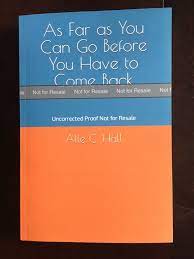For author Alle Hall, forgiveness is a complex topic. She explored forgiveness and healing personally and through her main character in her debut novel, “As Far As You Can Go Before You Have To Come Back.”
“Every faith practice that I am aware of has something important to say about forgiveness—and I apologize that these quick explanations are reductive. Buddhism understands forgiveness as something you seek rather than something you ask of someone. Fundamentally, forgiveness is there so that you don’t have to feel sullied. In Hindu Dharma, you are required to seek forgiveness in the cases that you’ve wronged another, and you should forgive as it is asked of you. Islam offers an elegant differentiation between being able “to forgive” and being able to “forgive and forget.” Islam says no Muslim should be stigmatized if they choose only “to forgive” because they are not ready or able to also “forget.” That is (to co-opt an expression from my 1970s youth) totally Awe-some. Christianity requires Christians to forgive if God is to forgive them. Without forgiveness, emotional healing is stalled,” Alle Hall explains.
For Alle, something she has noticed with abuse survivors is a struggle to forgive their abusers.
“It is in the gap between forgiveness and “I can’t” that I see so many abuse survivors fall. And stay stuck.”
As an adult, in returning to Judaism, I became aware that a surprisingly modern approach was part of one of the world’s oldest faiths, more than 5,000 years old. Let’s take forgiveness: every year, the ten days between Rosh Ha Shanna (the day of the new year) and Yom Kippur, (the day of atonement—which I have grown to look at as At-One-Ment), we have what are called The Days of Awe. During these ten days, if someone comes to you to make amends, you are required by halacha (Jewish law) to forgive them. There’s a caveat: if they stole your goat and say, “Sorry about that goat,” but don’t replace THE GOAT, the rest is commentary: they have not made amends.”
Alle rejected letting her healing process press pause until someone she can’t control decides to ask for her forgiveness and truly mean it by changing their actions.
“I reject letting my healing process press pause until someone I can’t control gets it together to ask for forgiveness. The offender is (at this point) in an abstract state of atonement didn’t; care about me—let alone take care of me—in the most basic way when I was a child. Unless they demonstrate a true understanding of how they damaged me and are making a serious attempt to change behavior, why would I believe that they care now?”
“For about 10 years, there was a blithe assertion under I really don’t: I don’t care! Having spent formative decades caring too much what an abuser thought, it was a relief to not care. Those feelings moved into a beige background as all the recovery work I was doing began to actualize: I went on a date. I didn’t sleep with him right away. I got a job that I liked. Then one I loved. I fell in love; after a shockingly normal period of time, I said, “Yes.” We got married, bought a house, had children—all that stuff that I grew up assuming only other girls got. The most amazing thing about my life today is its normalcy. Against the verdant, life-affirming, God-believing-in every-day, who has the time, the energy, the need for resentment? Forgiveness comes as a gift.”
It is everything to be able to walk the same planet as those who hurt you and not be burdened by their shame, guilt, and anger. To Alle Hall’s mind, the answer is acceptance. In “As Far as You Can Go Before You Have to Come Back,” main character Carlie comes to the realisation, “My family was the tiger. I did not have to embrace what they had done, only to accept that they had done it. To do that and remember that they were the tiger, that was freedom.”
Help keep news FREE for our readers
Supporting your local community newspaper/online news outlet is crucial now more than ever. If you believe in independent journalism, then consider making a valuable contribution by making a one-time or monthly donation. We operate in rural areas where providing unbiased news can be challenging. Read More About Supporting The West Wales Chronicle
























